In 2024, over 10 billion records were exposed in data breaches worldwide. That’s more records than there are people on Earth. Your email, password, phone number, or credit card details are likely sitting on a dark web marketplace at this very moment, listed alongside thousands of others for anywhere between $5 and $500.
So, what now? Can you actually remove your information from the dark web or is it there forever?
In this blog, we’ll walk you through what really happens when your data lands on the dark web, what you can (and can’t) do about it, and how to stay protected in the future.
Mitigata – Your Trusted Cybersecurity Partner
At Mitigata, we work in the shadows of the digital underground so you don’t have to. With 500+ cyber products and deep-rooted expertise across insurance, security, and compliance, we help organisations detect, analyse, and neutralise threats before they turn into full-blown crises.
Here’s what we watch 24/7:
- Hacker Forums
- Criminal Marketplaces
- Telegram Channels
- Breach Archives
- Exposed Assets
Mitigata doesn’t just send alarms. We turn noise into insight.
When we detect a threat, we uncover who’s behind it, what’s at risk, and how severe the impact could be.
Cybercriminals can’t hide when Mitigata monitors dark web threats
Mitigata delivers real-time detection, expert-led response, and market-best pricing for which your budget shouldn’t compromise.

Why You Can’t Fully Delete Data from the Dark Web
Once your data hits the dark web, it can’t be completely deleted. Here’s why:
The Dark Web Keeps Coming Back
When one dark web marketplace is taken down, several more appear to replace it. Criminals simply redirect their activities and re-upload the stolen data onto new platforms.
For example, when authorities closed down Genesis Market, one of the largest stolen data sites in 2024, the same information was discovered on many new marketplaces within weeks.
Data Gets Copied Infinitely
Your information isn’t stored in one location. The moment it gets posted, dozens of criminals download copies.
They store it on encrypted servers across different countries, share it in private forums, and trade it in closed Telegram groups.Taking down the original listing doesn’t affect these copies.
No Central Authority Exists
Unlike requesting Google to remove a search result or asking Facebook to delete your account, the dark web has no customer service department.
There’s no “Contact Us” button. These are criminal operations specifically designed to avoid oversight and operate beyond legal jurisdiction.
Old Data Never Disappears
Breach compilation databases archive years of leaked data. Your credentials from a 2019 breach might resurface in a 2025 compilation alongside fresh leaks. These archives get downloaded, redistributed, and repurposed indefinitely.
Every leaked password or record can shut down your business
Trusted by 800+ businesses, our platform ensures continuous protection with advanced features for you and your data.

Step-by-Step: How to Reduce and Protect Your Data Exposure
Here’s your action plan to take back control of your information:
| Step | Action | Why It Matters |
| 1. Change All Exposed Passwords | Update all passwords, especially for sensitive accounts. Use strong, unique ones. | Stops attackers from accessing other linked accounts. |
| 2. Turn On Multi-Factor Authentication (MFA) | Add verification layers for all logins. | Even if a password leaks, hackers can’t log in. |
| 3. Check Financial Accounts for Suspicious Activity | Review bank statements and credit reports regularly. | Helps detect fraud early. |
| 4. Contact Affected Platforms or Banks | Report exposure to get accounts locked or reissued. | Prevents further misuse. |
| 5. Use a Dark Web Monitoring Tool | Tools like Mitigata Console detect where and when your data appears again. | Provides real-time alerts for fast action. |
| 6. Request Data Takedowns Where Possible | Work with cybersecurity professionals to request removal from public sources. | Reduces accessibility of leaked data. |
How to Stay Protected in the Future
You can’t undo a breach, but you can stop the next one before it starts. Here’s your defence strategy:
Secure Your Credentials
You should stop reusing the same password across multiple accounts. Instead, you can consider a password manager, which stores all your credentials securely. You can also employ multi-factor authentication (MFA) to add additional layers of security.
Defend against Social Engineering
Phishing is considered one of the most common initial attack vectors. You should stay vigilant with phishing emails, unsafe attachments, and fraudulent links.
Explore the most common types of phishing attacks and how to defend against them in our detailed phishing email guide
Frequently Apply Patches and Updates
Outdated programs commonly contain unpatched vulnerabilities that can be leveraged by an attacker. To mitigate the attack surface, you should have a sustainable patch management process and ensure that all operating systems, apps, and security tools are updated to the latest versions.
Implement continuous monitoring
Enable real-time monitoring and anomaly detection for all essential accounts and systems. Set alerts for every login attempt, transaction, and password change. If it is a bank account, check every week, not monthly. The sooner you discover suspicious activity, the less damage can be done.
Engage with Security Experts
Cyber resilience companies like Mitigata monitor 24/7 across criminal forums, marketplaces, and breach databases, notifying you the instant your information appears so you can act before criminals.
Conclusion
Finding personal or business data on the dark web is not the end of the world. Though you can’t erase it but you can limit the damage it causes and prevent it from spreading further.
The goal is to respond quickly, stay updated, and build a robust defence strategy for the future.
The dark web never sleeps, and neither should your defences. Our dark web monitoring service provides 24/7 surveillance of criminal forums, marketplaces, and breach databases where your information might surface.
Contact us today!

